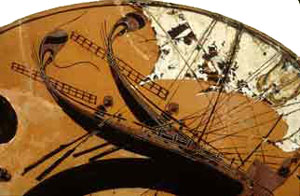
Classical Greek economy: Sailors rowing trading ships (Athens ca. 550 BC)
Greek mercenary soldiers
The trends of the Archaic period in Greece continued into the Classical period, about 500-400 BC, with both trade and fighting big contributors to the classical Greek economy. Greek mercenary soldiers fought for the Egyptians, who were trying to get free of the Persians, and they also fought on the other side, for the Persians. The money these soldiers earned helped to make Greece rich.

Women pounding wheat or barley into flour
Greek sailing and trade
Mainland Greece could not produce enough wheat to feed the people of Greece, so Greek traders continued to buy a lot of wheat from the area around the Black Sea, and also from Sicily, southern Italy, and southern France. In exchange, the traders sold wine and olive oil, wool cloth, perfume, and fancy pottery vases, as before.

Athenian silver coin with Athena’s owl
Silver mines at Laurion
But there was a big change from the Archaic economy too. In the 500s BC, under Pisistratus, the Athenians struck a big vein of silver at Laurion near Athens, which they began mining using thousands of slaves. The Athenians used their silver to make themselves rich. They built a big navy, and they used their powerful navy to get control of a lot of other Greek city-states, too. This empire made Athens much richer, and other parts of Greece poorer.
The Peloponnesian War
During the Peloponnesian War, beginning in 441 BC, though, the Greeks were all busy fighting each other, and the economy suffered. The silver mines at Laurion began to produce less, too. Many people went hungry, and all Greeks became much poorer than they had been before.
Learn by doing: making Greek coins
More on the Hellenistic economy of Greece
Bibliography and further reading about the economy of classical Greece:
Trade & Warfare, by Robert Hull (2000).
The Ancient Economy by Walter Scheidel, Sitta Von Reden (2002). A collection of essays by different specialists, but written for the non-specialist.
Economy and Society in Ancient Greece, by Moses Finley (revised edition 1983)
Economic and Social History of Ancient Greece: An Introduction by M.M. Austin and P. Vidal-Naquet (1980)
The Ancient Economy, by Moses Finley (revised edition 1999). This has been the starting point for academic discussions of the Greek and Roman economy since it first came out thirty years ago.




